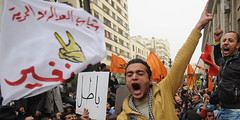
Egyptian opposition activists shout slogans outside the high court in downtown Cairo on December 12, 2010 during a demonstration against the results of the general election which they say was marred by fraud. a photo by Pan-African News Wire File Photos on Flickr.
March 05, 2011, 3:10 PM EST
By Jason Webb and Michael Patterson
March 6 (Bloomberg) -- Egyptian stocks listed overseas are trading at the lowest levels since before the protests that toppled Hosni Mubarak as the Cairo exchange’s continued closure threatens to deepen losses for investors the bourse is under pressure to protect.
Global depositary receipts of Commercial International Bank Egypt SAE sank 15 percent in London last week to the lowest level since July, while Orascom Telecom Holding SAE traded 5.2 percent below its close on Jan. 27, when the Egyptian Exchange shut down. The U.S.-traded Market Vectors Egypt Index ETF has lost 6.2 percent in two weeks even as the MSCI Emerging Markets Index rose 1.5 percent.
Egypt’s bourse on March 3 postponed plans to resume trading today, citing the resignation of Prime Minister Ahmed Shafik, and didn’t give a new opening date. Regulators said on March 2 they may require investment funds to disclose their shareholders as part of a probe of officials linked to Mubarak. The new rules and the exchange’s 24-day shutdown are deterring foreign investors and may spur a selloff when trading resumes, according to F&C Asset Management Plc and ING Investment Management.
Egypt risks becoming “a pariah of an investment destination,” said Jeff Chowdhry, the London-based head of emerging-market equities at F&C, which oversees about $163 billion worldwide. “If they value foreign investment in their stock market, they should get that market open immediately and take off any restrictions in terms of having too cumbersome administrative requirements.”
Investor Protests
The benchmark EGX 30 Index plunged 16 percent in its last two trading sessions before closing. Investors have protested outside the bourse in Cairo to demand that trades in the final days be canceled and that trading be suspended in companies with links to the former Mubarak regime.
The bourse extended its suspension on Feb. 14 because of worker protests disrupting bank operations, exchange spokesman Hisham Turk said at the time. The exchange said on Feb. 22 it would have to put off opening in order to implement rules to limit daily share price moves. It postponed a planned reopening on Feb. 28 after investors facing losses criticized exchange chairman Khaled Seyam at a news conference, calling for an extension of the closure.
The Egyptian Financial Regulatory Authority, the bourse’s regulator and the main clearing house, said on its website on March 2 that it may require brokerages and fund managers to disclose the owners of financial assets traded in the country as part of a probe of officials linked to Mubarak.
Declines Resume
The Market Vectors Egypt Index ETF, an exchange-traded fund in New York that holds Egyptian shares, rose 19 percent between Jan. 28 and Feb. 14, three days after Mubarak’s fall. It has since lost 9 percent as the Egyptian bourse remained closed. Orascom Telecom rebounded 12 percent before losing 10 percent.
The EGX30 could lose another 10 percent when it eventually reopens, said Slim Feriani, London-based chief executive officer of Advance Emerging Capital Ltd., which manages $750 million in frontier and developing nation stocks including Egyptian shares.
“It’s difficult for people like us as international investors to do much in these markets, no matter how much they fall in the next few days or weeks,” Feriani said in a phone interview. The outlook for Egypt’s economy and companies is too uncertain to make investment decisions, he said.
Foreigners hold about $13 billion in Egyptian shares, Barclays Capital said in a Jan. 18 report, and account for almost 25 percent of trading.
MSCI Membership
If the market is closed for 40 days or more, MSCI Inc. may begin investor talks to determine whether to remove Egypt from the MSCI Emerging Markets Index, Frank Nielsen, the company’s executive director for equity and applied research, said in a telephone interview from New York on March 1. The last country to be dropped from the index was Argentina in 2009, when it was reclassified as a frontier market, according to MSCI’s website. Israel was promoted out of the index to developed market status in 2010.
“On Egypt I’m really disappointed on the way it’s been handled,” said Fadi Al Said, a Dubai-based senior investment manager at ING Investment Management, which oversees about $518 billion worldwide. His ING L Invest Middle East & North Africa fund has beaten 88 percent of peers in the past year, according to data compiled by Bloomberg. “I hope that the market will open up soon and let’s get over with this cleanout, because this will create massive opportunities,” he said.
--Editors: Gavin Serkin, Stephen Kirkland
To contact the reporters on this story: Jason Webb in London at jwebb25@bloomberg.net; Michael Patterson at mpatterson10@bloomberg.net
To contact the editor responsible for this story: Gavin Serkin at gserkin@bloomberg.net.
No comments:
Post a Comment